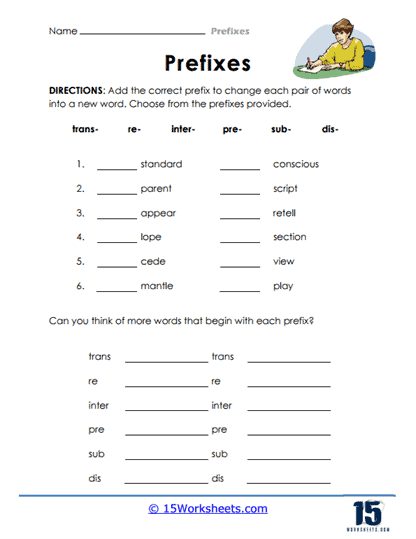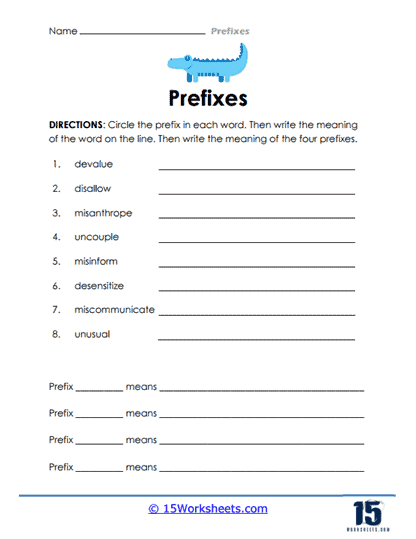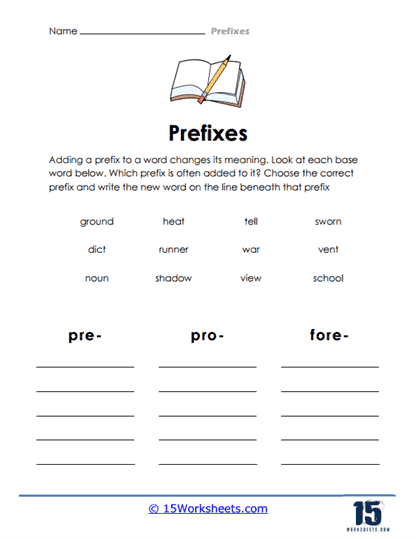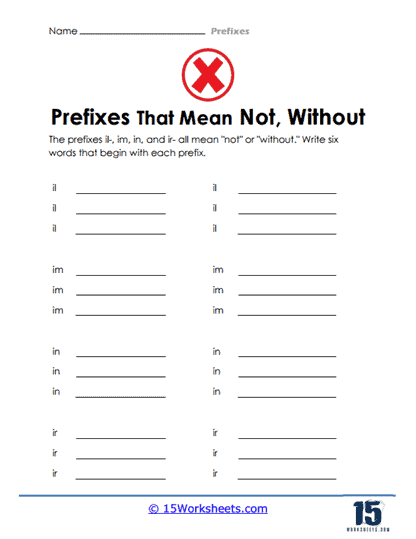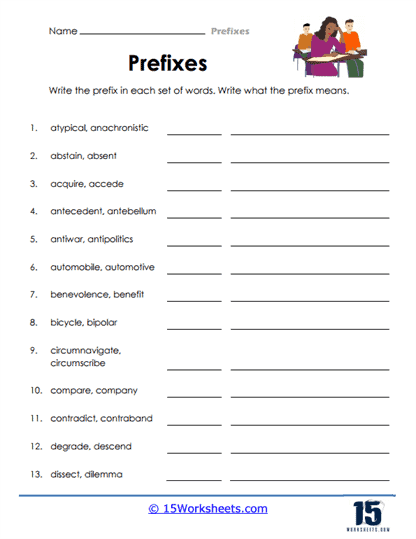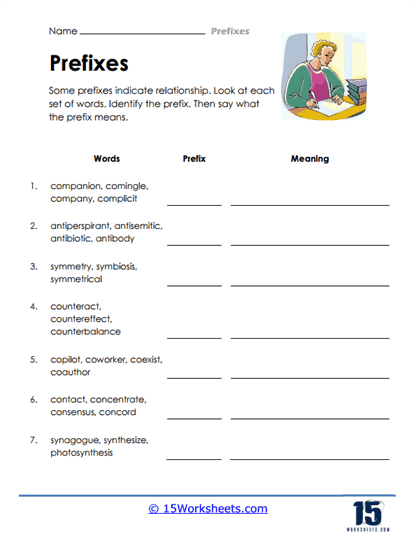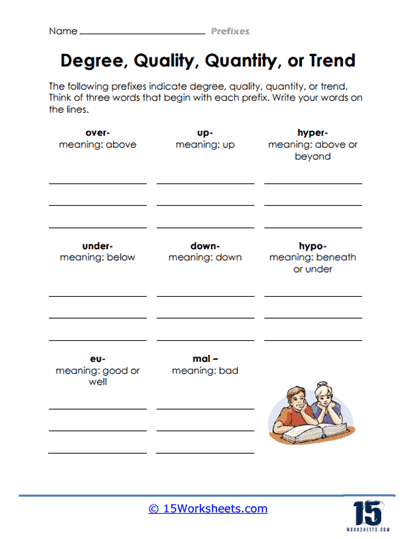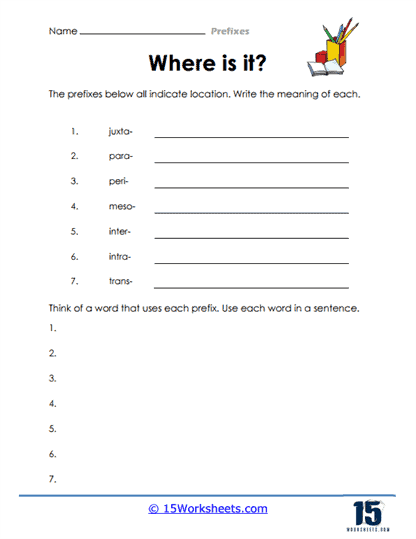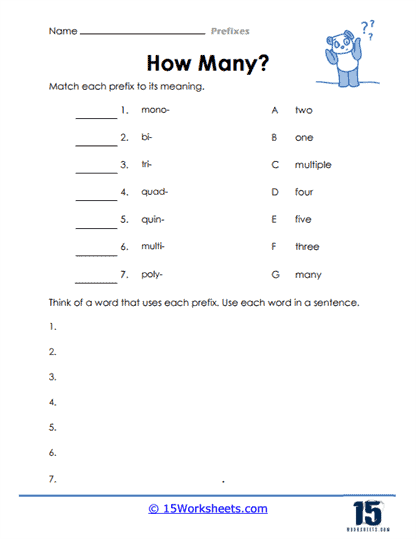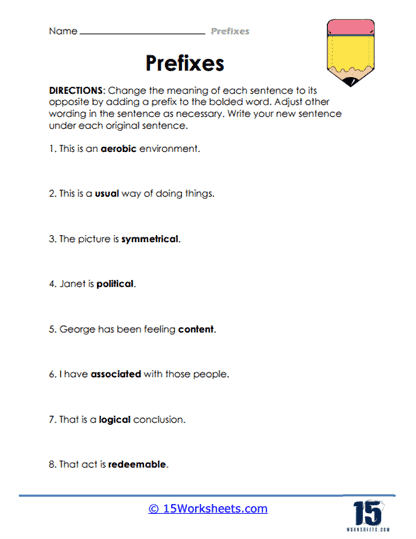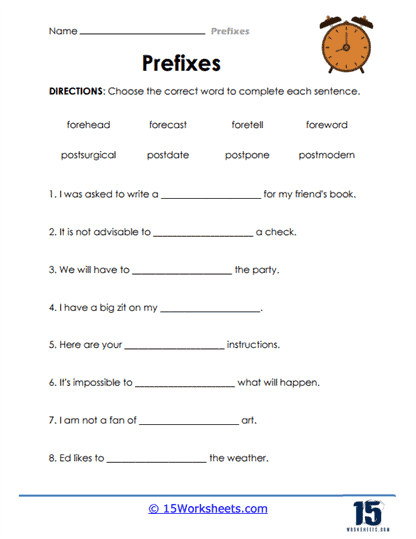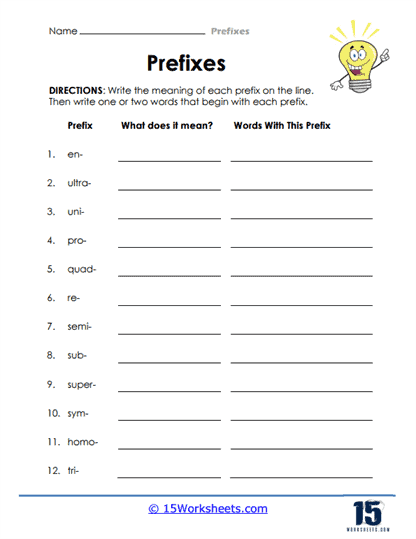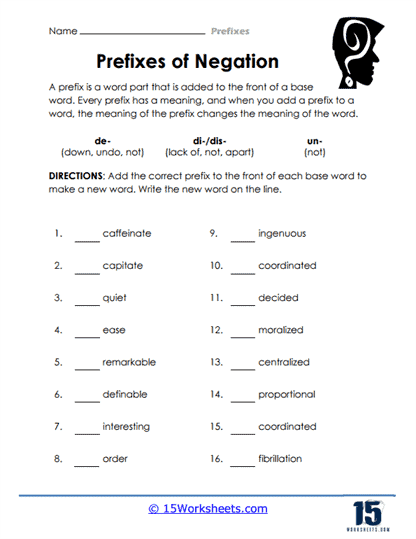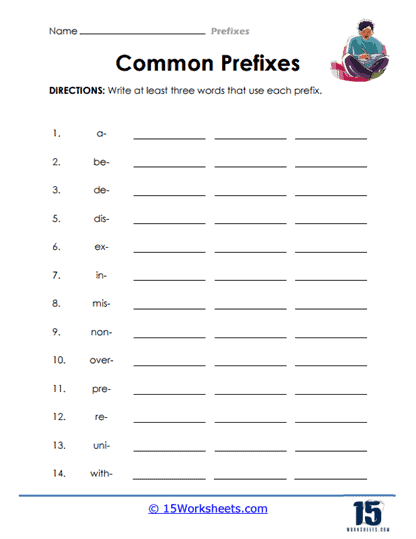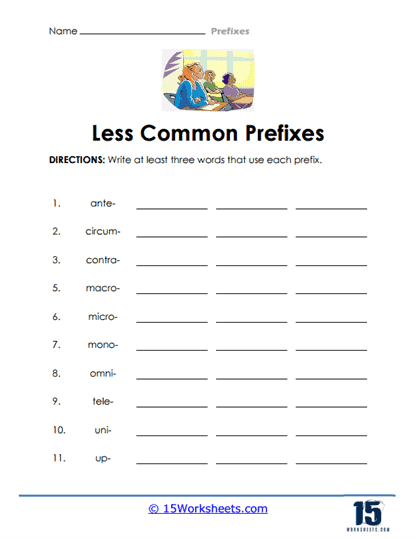Prefixes Worksheets
All About These 15 Worksheets
Teaching students how to use prefixes effectively is a crucial component of literacy education, and one of the most engaging ways to reinforce this skill is through thoughtfully designed worksheets. Prefixes are small but powerful elements of language that, when attached to the beginning of a word, have the ability to completely transform its meaning. Understanding how these linguistic building blocks work is not only essential for mastering word formation but also for enhancing a student’s overall command of the English language.
These prefixes worksheets serve as more than just a collection of exercises; they act as a bridge between passive knowledge and active language use. By guiding students through a variety of carefully structured activities, the worksheets help learners not only recognize prefixes but also use them confidently in their writing and speech. Through a series of examples, hands-on exercises, and word-creation tasks, students are given the opportunity to explore the dynamic nature of language in a way that feels accessible and rewarding.
The exercises included in these worksheets range from straightforward identification tasks-where students locate and underline prefixes within a word-to more creative challenges that encourage them to add prefixes to base words and observe how their meanings shift. This process of word transformation sparks curiosity and invites students to see language as something they can actively manipulate. It empowers them to play with words, to experiment with meaning, and to discover new ways to express themselves.
One particularly effective activity is filling in the blanks with the correct prefix. In this task, students must use their knowledge of prefixes to complete sentences, thereby demonstrating their understanding of both the prefix’s meaning and its effect on the base word. This exercise strengthens their vocabulary by reinforcing how prefixes like “un-,” “pre-,” “dis-,” or “re-” can significantly alter the direction of a sentence. Each new word they create becomes a tool they can carry into their future reading and writing experiences.
But the learning doesn’t stop at identifying and applying prefixes. These worksheets also challenge students to define the meanings of prefixes in their own words-a step that encourages deeper thinking. By asking students to articulate the function of a prefix, they are pushed to go beyond rote memorization and develop a true grasp of how prefixes work in context. They begin to recognize patterns in language, understanding not just what a prefix does but why it changes a word in the way it does. This kind of comprehension lays a foundation for more advanced linguistic skills, such as analyzing complex words and improving decoding abilities in reading.
The worksheets encourage students to take their newfound knowledge and use it in sentence creation. Writing their own sentences using words with prefixes fosters an active engagement with language, requiring students to think critically about how the meaning of a word can be altered simply by adding a few letters. It’s in these moments of creation that students move from being passive receivers of information to active language users. They begin to understand that language is not a static set of rules but a flexible system that they can shape to suit their communicative needs.
The transformative nature of these worksheets doesn’t end with vocabulary. As students learn to manipulate prefixes, they are also sharpening their reading comprehension skills. Words are the building blocks of sentences, and sentences are the framework of comprehension. By learning how to break down words into prefixes and root forms, students develop the ability to decode unfamiliar vocabulary, making it easier for them to grasp the meaning of challenging texts. This process of deconstruction enhances their reading fluency and gives them the confidence to tackle more advanced material.
For educators, the value of these worksheets extends far beyond their immediate utility. They provide a scaffolded approach to learning, offering students structured support as they explore new concepts. The progression from simple identification tasks to more complex word-building and sentence-writing exercises mirrors the natural development of language skills, allowing students to build their understanding incrementally. Teachers can also use these worksheets as a diagnostic tool, identifying areas where students may need additional support or reinforcement.
By consistently working through these worksheets, students develop a robust understanding of prefixes and their roles in language. This not only expands their vocabulary but also equips them with the tools needed to approach language with confidence and curiosity. They learn that words are not fixed entities but living components of communication that can be molded, expanded, and enriched through the use of prefixes.
Commonly used prefixes
Prefixes are groups of letters that are added to the beginning of a word to change its meaning. Here is a list of common prefixes and their meanings.
- Anti-: against or opposite (e.g. anti-inflammatory, anticlimax)
- De-: opposite of or reversing (e.g. defrost, deactivate)
- Dis-: not, opposite of or undoing (e.g. disagree, disconnect)
- Ex-: former or out of (e.g. ex-boyfriend, exhale)
- In-, im-, il-, ir-: not or opposite of (e.g. incapable, impossible, illegal, irrelevant)
- Inter-: between or among (e.g. international, interconnect)
- Mis-: wrong or incorrect (e.g. misunderstanding, misinterpret)
- Non-: not or without (e.g. nonfiction, nonverbal)
- Over-: too much or excessive (e.g. overestimate, overload)
- Pre-: before or in advance (e.g. preview, prepay)
- Re-: again or back (e.g. redo, review)
- Sub-: under or below (e.g. submerge, subpar)
- Super-: above or beyond (e.g. supernatural, superstar)
- Trans-: across or beyond (e.g. transfer, transport)
- Un-: not or opposite of (e.g. unclear, unhappy)
These are just some of the most common prefixes, but there are many others that can be used to change the meaning of words. By learning and understanding these prefixes, students can expand their vocabulary and better understand the meaning of words they encounter in their reading and writing.
Teaching Prefixes
Teaching prefixes to children is a valuable step in helping them understand how words are constructed, enhancing both their vocabulary and reading comprehension. To make the learning process engaging and effective, it’s essential to break it down into manageable, clear steps while incorporating interactive and fun activities. Here’s a detailed guide on how to approach teaching prefixes to kids.
1. Introducing the Concept of Prefixes
Start by explaining what prefixes are in simple terms. A prefix is a group of letters added to the beginning of a word that changes its meaning. For young learners, using real-life examples is helpful. You can explain that just as a “pre” in “prefix” means “before,” a prefix always comes at the front of a word. Relating this to everyday language, like how “un” changes “happy” to “unhappy,” can make it more relatable and memorable for kids. Additionally, clarify that although a prefix changes a word’s meaning, it never stands alone as a word.
2. Use Visual Aids and Examples
Children often learn best when they can visualize concepts. Create charts or flashcards showing common prefixes, such as “un-,” “re-,” “pre-,” “dis-,” and “mis-,” along with examples. For instance, show how the word “do” becomes “undo,” “play” becomes “replay,” and “like” becomes “dislike.” By seeing the root word and how the prefix changes its meaning, children can grasp the concept more easily. This visual association helps reinforce the idea that prefixes modify the meaning of the original word.
3. Break Down the Meanings
Once children are familiar with the prefixes, it’s essential to break down the meanings of each. Begin with a few common prefixes at a time, such as “un-” (which means “not” or “opposite of”), “re-” (meaning “again”), and “pre-” (which means “before”). Create simple, real-life examples they can relate to. For instance, explain that “un-” turns “tidy” into “untidy” or “wrap” into “unwrap.” This association with everyday actions helps children connect words to their meanings and builds their comprehension.
4. Interactive Activities
Hands-on activities are vital for engaging children. A fun exercise is to have a set of root words and a set of prefixes on cards. Children can mix and match to create new words. They could also play a “prefix scavenger hunt” by finding words with prefixes in their favorite books or around the classroom. You could even ask them to use new words they’ve created in sentences to show they understand the meaning of the prefix. Games like prefix bingo or matching games can also be engaging ways to reinforce the concept.
5. Contextual Learning with Sentences
It’s important for children to not only recognize prefixes but also understand how they change the meaning of words in context. Use sentences where the meaning of the word with the prefix is crucial to the overall sentence meaning. For example, compare the sentences “The door is locked” and “The door is unlocked” and ask students how the prefix “un-” changes the meaning of the sentence. This exercise helps children see how prefixes function in real language use, making them more confident in their reading and writing.
6. Practice and Reinforcement
Repetition and practice are key in reinforcing new knowledge. Encourage children to keep a personal word journal where they can write down new prefix-based words they come across or learn each day. Include quizzes or quick daily challenges, like asking kids to write a sentence using a word with a specific prefix. Online educational games and apps that focus on prefixes can also be helpful tools to reinforce their learning in a fun and interactive way.
7. Discuss Irregularities and Exceptions
As children progress, introduce the idea that not all prefix meanings are straightforward. For example, explain that while “re-” usually means “again,” there are exceptions, such as in the word “resign,” where it doesn’t mean “sign again.” Discussing these exceptions ensures that children are not confused later when they encounter them in their reading. However, it’s essential to emphasize that the majority of words with prefixes follow the general rules they’ve learned.

